Looking Back on the Very Beginning
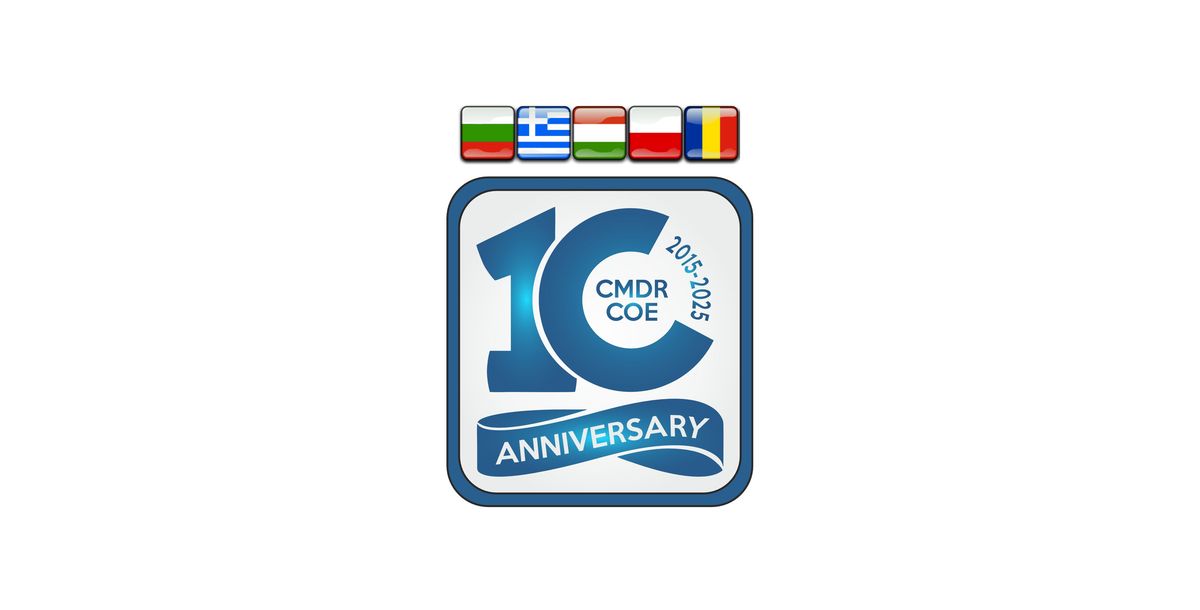
Date: (31-03-2025)
NATO's Centres of Excellence are international military organisations that are designed to provide education and training, assistance in doctrine development, lessons learned, and to support NATO to improve interoperability and defence capabilities, to test and validate concepts through experimentation. The process of development the Alliance centres significantly accelerated with Smart Defence initiative, declared at the NATO summit in Chicago, May 2012. The main objective of this approach was development of specialised expert entities in NATO that support the Alliance transformation with avoiding duplication of nations’ existing efforts, means, resources and capabilities.
NATO’s Centres of Excellence are international military organisations that are designed to provide education and training, assistance in doctrine development, lessons learned, and to support NATO to improve interoperability and defence capabilities, to test and validate concepts through experimentation. The process of development the Alliance centres significantly accelerated with Smart Defence initiative, declared at the NATO summit in Chicago, May 2012. The main objective of this approach was development of specialised expert entities in NATO that support the Alliance transformation with avoiding duplication of nations’ existing efforts, means, resources and capabilities.
In 2011, the Bulgarian Ministry of Defence initiated a project of development an expert entity, designed to assist national institutions and to provide specialised expertise for NATO nations in area of crisis management and disasters response. The project started with the establishing of a working group for development a Centre for high level of competences. The group was tasked to define an appropriate functional area and name of the Centre, to develop drafts of vision, plan and financial assessment of the project, and later on to develop a draft Concept of the Centre. The name of “Crisis Management and Disaster Relief” was contrived at that time. At the end of the 2011, the internal process of coordination was finished and the draft strategic documents for further establishing of the Centre was developed and deconflicted institutionally by Colonel Prof. Mitko Stoykov. The project was used to promote the Bulgarian MOD initiative at all possible levels of NATO, like Concept Development and Education, and Transformation Conferences, international visits and conversations. The process of deconflicting with other similar NATO entities was time consuming, prolonged up to six month.
On March 22, 2012, in accordance with the established NATO procedures for the construction of the centres, a team for the implementation of the project was established by order of the Bulgarian Minister of Defence. Taking into account the opinions of NATO Headquarters, the Joint Staff, member states and NATO centres, a second version of the Centre’s concept was developed.
The Centre was established as an independent legal entity under Article 60 of the Administration Act and a secondary budget appropriations officer under the Bulgarian Minister of Defence with Decree of the Council of Ministers No. 291/16.11.2012 (published in the State Gazette on 23.11.2012). The First Conference on the Establishment of the Centre was planned and held as results were agreed version of the Centre Concept, considered versions of the Centre’s Operational and Functional Memorandums of Understanding, proposed versions of job descriptions of the participating countries.
The Second Conference was held from March 25-27, 2013 where a support was received by the Hellenic Republic and the Republic of Poland to become the Centre’s Sponsoring countries as well as variants of the Operational and Functional Memoranda of Understanding have been agreed upon and future activities for the construction of the Centre and a time frame for their implementation until its accreditation by NATO have been identified.
NATO Partner countries also expressed increased interest in the implementation of the project (Austria, Sweden, Georgia, Ukraine, N.Macedonia, etc.). In response to questions raised by them in the NATO Military Committee, the Centre was presented at a meeting of the committee in the Euro-Atlantic Partnership Council (EACP) format on May 28, 2013. On May 27, 2013, the project was presented to the Working Group of the EU Military Committee, which requested that Bulgaria, after accreditation, provide the Centre to support the development of EU capabilities. In order to avoid duplication and competition in crisis management and disaster response capabilities between NATO and the EU, a questionnaire on the Centre’s activities in the field of training and preparation was completed and sent at the request of the EU. Contacts with NATO and EU structures continue to identify additional opportunities for cooperation and interaction.
Activities for the construction of the Centre and deadlines for their implementation:
• Continuation of talks with ministries and departments in the country for the accession of their experts to the centre – Ministry of Interior, Ministry of Transport and Communications, Ministry of Justice, Ministry of Regional Development and Public Works, Ministry of Public Works and Public Works, and others.
• National ratification of the Memorandums of Understanding for each of the Centre’s sponsoring countries (Bulgaria, Greece, Poland) – completed at the end of July 2013;
• Preparation and submission of a self-assessment of the Centre for the beginning of its accreditation – completed by the end of June 2013;
• Familiarization of the Allied Command Transformation with the self-assessment and its adoption – by mid- October 2013;
• Organization and holding of a ceremony for the official signing of the Memoranda of Understanding by the sponsoring countries of the Centre – 28.08. 2013;
• Organization and holding of the meeting of the Centre’s Management Board and visit of the NATO accreditation team – 11-12.09. 2013;
• Holding meetings and preparing interdepartmental agreements for filling expert positions by interested ministries and organizations from the country – by the end of October 2013;
• Presentation of a report by the ACT to the NATO Military Committee and a proposal to the NATO North Atlantic Council (NAC) to approve the accreditation of the Centre – by the end of October 2013.
• Decision by the NAC to grant the status of an International Military Organization – November -December 2013
After the Centre’s accreditation is completed, due to the extremely strong interest from the Partners, the preparation and conclusion of Technical Agreements with partner countries wishing to join it will begin.
Nevertheless of all effort and results, including agreement between Bulgaria and ACT, in September 2013, the new MOD leadership withdrew its support for Bulgaria’s unwillingness to build a NATO centre on its territory. A number of administrative tricks and obstacles were used to erase the hard-won achievements. In early 2014, the Ministry of Defence decided to change the status of the Centre, make it part of the Military Academy and lower the level of the expert positions. As a result, most of the appointed personnel with extremely high expertise left the Centre forever. After the change of MOD political leadership the following year, the project to build the CMDR COE was restarted.
News
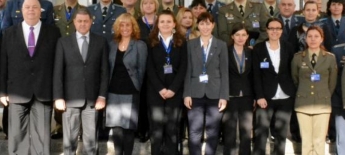 CENTRE HAS EARNED STATUS AS THE 21st NATO COE AND ACTIVATION AS A NATO MILITARY BODY
CENTRE HAS EARNED STATUS AS THE 21st NATO COE AND ACTIVATION AS A NATO MILITARY BODYThe Crisis Management and Disaster Response Centre of Excellence (CMDR COE) is delighted to announce that the on 31st March the silence procedure by NAC has ended and the Centre has earned status as the 21st NATO COE and its activation as a NATO Military Body with a granted international status under Article 14 of the Paris Protocol, as recommended by HQ SACT.
» read more
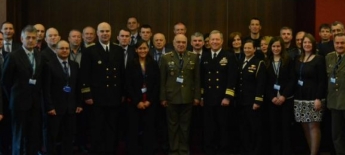 Climate Change Adaptation Seminar Unveiled
Climate Change Adaptation Seminar UnveiledAfter successful conduction of the seminar "Visualizing Implication of Climate Change on Military Activities and Relationships" in 2013, its successor "Building Resiliency and Decreasing Vulnerability through Climate Change Adaptation" was unveiled on 30 March 2015. Commodore Mihaylov, director of the Operations and Training Directorate - Bulgarian MOD, formally opened the seminar in Triaditza Hall at Grand Hotel Sofia. The event brings together flag-level representatives of governmental bodies from several NATO countries and 4 PfP nations. It is hosted again by CMDR COE and organized in partnership with the U.S. European Command.
» read more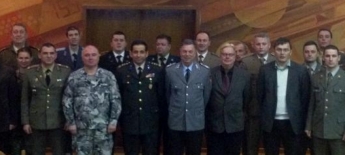 CMDR COE Supports Ex-Balkan Bridges`2015 IPC
CMDR COE Supports Ex-Balkan Bridges`2015 IPCThe aim of this hybrid training event is to enhance Balkan States′ capabilities to respond to a regional crisis while testing and improving interoperability of their Modeling and Simulation capabilities.
The IPC organized by Joint Force Command, was held in Charalitsa on 18 and 19 of March 2015. Participants from Ankara, Athens, Belgrade, Bucharest, Podgorica, Sarajevo, Skopje, Sofia, Tirana and NATO – JFTC took part in the meeting.
The busy schedule of the event included brief and discussions on the EXPLAN, Geo-strategic situation and initial assessment. Fruitful syndicate work with important deliverables for the exercise development process were held.
» read more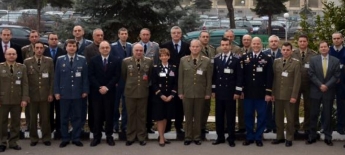 Rewarding Outcome of the Higher Command Crisis Response Operations Course
Rewarding Outcome of the Higher Command Crisis Response Operations CourseThe Crisis Management and Disaster Response Centre of Excellence (CMDR COE) successfully conducted the pilot Higher Command Crisis Response Operations Course from 24th to 26th of February 2015.
The aim of the course was to introduce the attendees to the competences and tools, enabling successful application of solutions in response to crisis in national or international environment.
The objectives were fully covered over the course of three days which resulted in common understanding on NATO Crisis Management and Political-Military relations and armed the participants with proper tools for management of main activities connected to Political-Military Estimate at Strategic Level.
» read more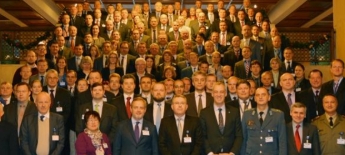 CMDR COE Hosts the Final Adaptation Planning Conference for NATO Crisis Management Exercise 2015
CMDR COE Hosts the Final Adaptation Planning Conference for NATO Crisis Management Exercise 2015On Dec 16th, 2014, the Bulgarian Deputy Defence Minister, Mr. Dimitar Kyumyurdzhiev formally opened the Final Adaptation Planning Conference (FAPC) for the Crisis Management Exercise (CMX) 2015. Involving 153 participants from NATO states plus Australia, Japan and Ukraine it had the aim to finalize and adapt the training efforts in order to carry out successfully the upcoming CMX 2015 as effectively and efficiently as possible. "We, representatives of all member states, must be responsible for ensuring that we have in place crisis management and organization capable for managing any unexpected situation. We have to maintain and further develop our capabilities as to fulfill the expectation that the public has entrusted us", pointed Mr. Kyumyurdzhiev in his opening speech.
» read more Crisis Response Operations Planners Professional Development Course was successfully conducted
Crisis Response Operations Planners Professional Development Course was successfully conductedThe Crisis Management and Disaster Response Centre of Excellence (CMDR COE) successfully conducted the pilot Crisis Response Operations Planners Professional Development Course from 26th to 28th November 2014.
Numerous experts attended the course including representatives from the Bulgarian Ministry of Defence, JFC, Army, Chief Directorate Fire Safety and Civil Protection under the Ministry of Interior, Bulgarian Red Cross, as well as representatives from the Defence Administration Office and the Ministry of Human Resources of Hungary, and the CCD COE, Estonia.
» read more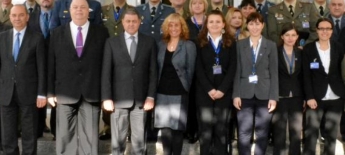 Successful Accreditation visit to CMDR COE
Successful Accreditation visit to CMDR COEOn 24-25 November 2014, the Crisis Management and Disaster Response Centre of Excellence (CMDR COE) hosted two important events – the 2nd Steering Committee Meeting and the Accreditation Visit from HQ SACT.
During the Steering Committee meeting on 24 November, the SC members approved the proposed Program of Work 2015 of the Centre as well as the proposed CMDR COE budget estimates for FY-2015.
» read more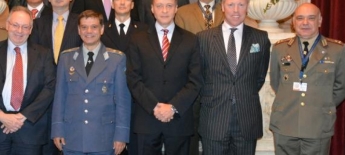 CMDR COE hosted NATO Flag-level StratCom Course
CMDR COE hosted NATO Flag-level StratCom Course On 22 October 2014, the Deputy Chief of Defence, Major General Konstantin Popov opened the Flag-level Strategic Communications Course.
Organized by the Ministry of Defence of the Republic of Bulgaria and CMDR COE in partnership with HQ SACT and STRATCOM COE, the course brings together flag-level representatives of governmental bodies from 11 countries - with the goal to enhance the common understanding in the field of Public Diplomacy, Public Affairs, Information Operations and Psychological Operations.
» read more
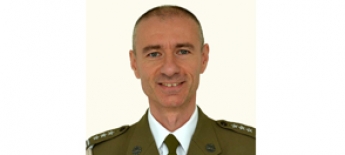 Another international assignment at CMDR COE
Another international assignment at CMDR COECMDR COE is pleased to announce that COL Jarosław KUBISZ is joining the Centre to run our Transformation Branch activities.
COL Jarosław KUBISZ representing the Polish Armed Forces (PAF). He finished officers′ military school in 1994, and Academy of National Defence in 2002. Last time he served inter alia in Operational Directorate of the General Staff of the PAF and Crisis Management Centre of the Ministry of National Defence. In both mentioned above institutions he has dealing with crisis management matters in PAF and NATO as well.
» read more CMDR COE will conduct Crisis Response Operations Planners Professional Development Course
CMDR COE will conduct Crisis Response Operations Planners Professional Development CourseCrisis management is one of the fundamental security tasks of the Alliance along with collective defense and cooperative security. Depending on the nature of the crisis, different types of crisis management operations may be required. The good operations planning process understanding is essential for all NATO Planners. In line with this, Crisis Management and Disaster Response Centre of Excellence (CMDR COE) developed and will run pilot Crisis Response Operations Planners Professional Development Course from 26th to 28th November 2014. The course will be held in English at Shipka hotel, Sofia, Bulgaria.
» read more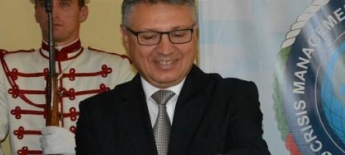 Opening ceremony of the CMDR COE as an International Organization
Opening ceremony of the CMDR COE as an International Organization"We have to learn to counter effectively to the new hybrid type of crisis and disasters, destabilizations and confrontations. And this Centre is a way ahead", stated the Bulgarian president Mr. Rosen Plevneliev in his address to the Opening ceremony of the Crisis Management and Disaster Response Centre of Excellence (CMDR COE) as an International Organization. The ceremony was with the presence of ambassadors and military attaches of diplomatic missions accredited to the Republic of Bulgaria, commanders of the armed forces, and representatives of other ministries and departments.
» read more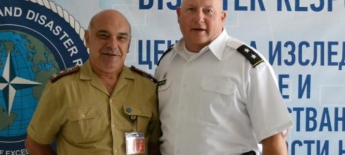 A Standing Invitation to the CMDR COE from the Tennessee National Guard
A Standing Invitation to the CMDR COE from the Tennessee National GuardThe Crisis Management and Disaster Response Centre of Excellence (CMDR COE) welcomed Major General Terry M. Haston, the Adjutant General Tennessee National Guard for an official visit on August 7th, 2014.
During his visit, Maj. General Haston had an office call with the CMDR COE Director, Col. Vassil Roussinov. The meeting was attended by Maj Hancock, bilateral affairs officer, Office for Defense Cooperation of US Embassy and CMDR COE branch chiefs, Col Nikolay Nikolov and LtC Dimitar Dimitrov.
» read more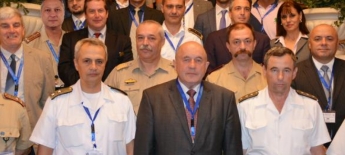 Outstanding upshots gained from the CMDR COE’s Annual Seminar
Outstanding upshots gained from the CMDR COE’s Annual SeminarCMDR COE has successfully hosted its 2nd Annual Seminar, which is designed to facilitate meeting of experts and sharing of experience among bodies dealing with crisis and disaster response. The event took place from 1st to 3rd July, 2014 in Sofia.
Interagency interaction in crisis management and disaster response was the main topic of the seminar. "...If we are united and share our common experiences we will be ready to tackle the different and sometimes unexpected crises and disasters. Crucial for this is the interagency cooperation..." pointed out Rear Admiral Petev in his opening speech.
» read more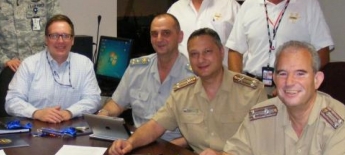 Fruitful cooperation between CMDR COE and TEMA
Fruitful cooperation between CMDR COE and TEMACMDR COE delegation was in Nashville, Tennessee to attend the four-day 2014 CAPSTONE exercise (16-19 June 14) led by the Tennessee Emergency Management Agency (TEMA). The purpose of this visit was to make acquaintance with the TEMA procedures and practices of designing and conducting disaster response exercises. The current one was on a scenario of an earthquake with magnitude 7.7 resulting into severe impacts in 8 states. During the exercise were briefings and presentations concerning the organization and responsibilities of the state′s entities in response of a disaster. CMDR COE team held meetings with representatives from the private sector and Red Cross & Red Crescent who present their engagements in case of emergencies. The CMDR COE delegation was well received by MGen Terry M. Haston, commissioner of the Tennessee Department of Military as he praised the successful partnership between CMDR COE and the State of Tennessee. He also highlighted ideas for further cooperation as more significant contributions by civilian organizations from NATO countries.
» read more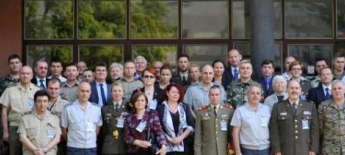 Another International recognition for the CMDR COE
Another International recognition for the CMDR COEThe CMDR COE has received a formal letter of appreciation on behalf of the Croatian Armed Forces General Staff. It recognizes the great efforts CMDR COE Mobile Training Team has done to conduct courses in regard of the of exercise SEESIM 14 preparation process. Expressing special thanks, the Croatian site states the desire to develop cooperation in future.
» read more
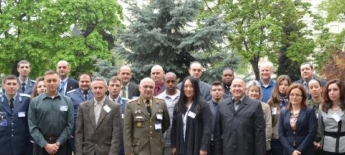 CMDR COE hosted the workshop Military Medical Response in Disaster Management
CMDR COE hosted the workshop Military Medical Response in Disaster ManagementOn 28-30 April 2014, the Crisis Management and Disaster Response Centre of Excellence (CMDR COE) hosted the workshop Military Medical Response in Disaster Management, sponsored by US European Command (USEUCOM) and the Bulgarian Ministry of Defence. The 3-day workshop focused on topics related to principles and practices of medical and psychological support in military missions as well as in operations in response of disasters. The workshop was attended by more than 25 participants from the Bulgarian Military Medical Academy, Joint Force Command, Land Forces, Air Force, medical experts from the services HQs, and Bulgarian Red Cross. Informative presentations delivered by instructors of 212-th Combat Support Hospital and Military Medical Academy and fruitful discussions during each session treated of important issues like framework of disaster planning process, components of basic and contingency plans, psychological aspects of disaster reaction and preventive medicine.
» read more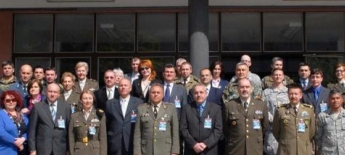 Exercise Planners’ Training Course was conducted by CMDR COE NDA Mobile Training Team (MTT)
Exercise Planners’ Training Course was conducted by CMDR COE NDA Mobile Training Team (MTT)The Exercise Planners′ Training Course was conducted by the Crisis Management and Disaster Response Centre of Excellence (CMDR COE) National Defense Academy Mobile Training Team (MTT) in conjunction with the SEESIM 14 Main Planning Conference (MPC) in the Croatian Defense Academy in Zagreb from 31 March to 1 April 2014.
The course was designed to enhance the theoretical knowledge and practical skills of NATO and Partners′ Exercise Planners. The course was attended by 46 participants from Albania, Bosnia and Herzegovina, Bulgaria, Croatia, Georgia, Romania, Montenegro, the Former Yugoslav Republic of Macedonia, USA, Greece, and SEEBRIG.
The participants were familiarized by members of the MTT with NATO and EU approaches in crisis management and disaster response as well the main exercise planning documents and stages. Presentations "Introduction to Exercise Planning Process", "NATO and EU Crisis Management Systems and Mechanisms", "Main Stages in NATO Exercise Planning Process", "Computer Assisted Exercises and Simulations", and "NATO Crisis Management and Operations Planning" was included in the main part of the course.
» read more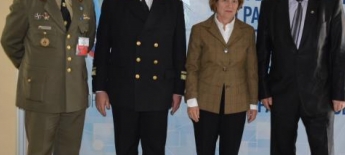 High level visits in the CMDR COE and SABER GUARDIAN exercise
High level visits in the CMDR COE and SABER GUARDIAN exerciseU.S. Ambassador to Bulgaria, Marcie B. Ries paid a special visit to the Host Nation Coordination Cell (HNCC) a component of Saber Guardian 2014 co-hosted by the CMDR COE. The Ambassador took part in a VTC with the 7th Civil Support Commander at Novo Selo Training Area and expressed an active interest in matters of the exercise. The Ambassador familiarized with the objectives and goals of Saber Guardian 14 provided realism to the exercise execution. The CMDR COE then hosted the Ambassador at their headquarters where she met with the CMDR Staff.
» read more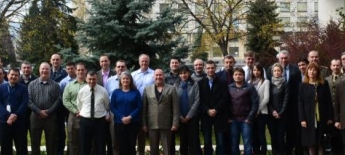 CMDR COE participates in the Saber Guardian 2014 Exercise
CMDR COE participates in the Saber Guardian 2014 ExerciseU.S. Army Europe (US EUCOM) and the Bulgarian Land Forces Soldiers kicked off Saber Guardian 2014 on Mar 31, 2014.
Saber Guardian 2014 is a multinational training exercise designed to reinforce U.S. Army Europe′s commitment to increasing regional flexibility, preserving and enhancing NATO interoperability, and facilitating multinational training.
USAREUR Deputy Commanding General, Maj. Gen. Richard Longo, and Deputy Commander of the Bulgarian Land Forces, Brig. Gen. Krasimir Kanev, will serve as this year′s exercise co-directors.
» read more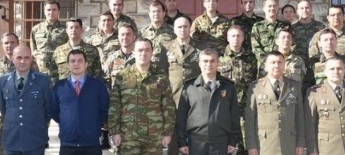 A Mobile Training Team (MTT) has conducted a Crisis Management and Disaster Response Workshop 17-19 Feb 14, Larissa, Greece
A Mobile Training Team (MTT) has conducted a Crisis Management and Disaster Response Workshop 17-19 Feb 14, Larissa, GreeceA Mobile Training Team (MTT) consisted by lectures from the CMDR COE and National Defense Academy has conducted a Crisis Management and Disaster Response Workshop. It took place at the South-Eastern Europe Brigade (SEEBRIG) HQ in Greece from 17 to 19 February 2014. The MTT was led by col.Lyubomir Simeonov, Deputy Chief of National Defence Academy
The SEEBRIG was established and activated by seven participating Nations on 31st of August 1999 and is currently located in Larissa. The workshop goals were to provide educational information and details for the Crisis Management understanding and the NATO COEs Network covering the HQ staff area of interest by:
» read more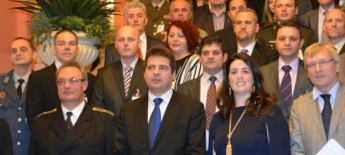 Civil-Military Interaction: Disaster Preparation and Response Workshop has been opened and conducted
Civil-Military Interaction: Disaster Preparation and Response Workshop has been opened and conductedA welcoming speech of the Ambassador of the Federal Republic of Germany, His Excellency Matthias Hoepfner has opened the Civil-Military Interaction: Disaster Preparation and Response Workshop, which is taking place in Sofia, 11-13 February 2014. The event is under the patronage of George C. Marshall European Center for Security Studies and co-hosted with the Crisis Management and Disaster Response Centre of Excellence (CMDR COE). The workshop is attended by representatives from civilian and military structures from 11 countries – Albania, Bosnia and Herzegovina, Bulgaria, Germany, Greece , FYROM, Kosovo, Romania , Croatia, Montenegro and USA. In addition on the American side taking part are delegations from the National Guard of the states of Vermont, Maine, Maryland, Minnesota, New Jersey and Tennessee as part of the State Partnership Program.
» read more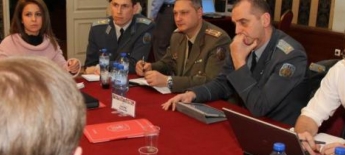 The Final Planning Conference of the exercise Saber Guardian 14 has finished successfully
The Final Planning Conference of the exercise Saber Guardian 14 has finished successfullyThe Final Planning Conference of the exercise Saber Guardian 14 was held in Sofia last week (3-7 Feb 2014). The CMDR COE experts headed by LtC Orlin Nikolov, head of Capabilities Branch, participated in the workshops of the Contingency Management Planning/Unified Action (CPM/UA) syndicate.
On February 5, 2015, the CPM/UA members met with representatives of several GOs and NGOs. The meeting was arranged by the CMDR COE and co-hosted with the J9 USEUCOM as there were entities as Bulgarian Ministry of Interior, Chief Directorate Fire Safety and Civil Protection, State Agency of National Security, State Agency for Refugees, Bulgarian Academy of Science, Military Medical Academy, Red Cross, Caritas Bulgaria, Gender Research Foundation, Tennessee National Guard, Bulgarian Modeling and Simulation Association (BULSIM). The purpose of the meeting was to present them the scenario and storyline of their engagement into the exercise.
» read more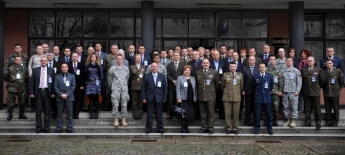 The initial planning conference for the SEESIM 14 exercise was held in Zagreb, Croatia
The initial planning conference for the SEESIM 14 exercise was held in Zagreb, CroatiaThe initial planning conference for the distributed computer assisted exercise South Eastern Europe Simulation Network (SEESIM 14) was held in Zagreb, Croatia. The Republic of Bulgaria is co-organizer and participates actively in the conducting of the exercise together with the Host Nation. Among the participants are also representatives of Albania, Bosnia and Herzegovina, Georgia, Montenegro, Romania, the Former Yugoslav Republic of Macedonia, United States of America and the SEEBRIG.
The exercise is held under the auspices of the Ministers of Defence of the SEE Nations.
» read more
 CMDR COE FEBRUARY Forthcoming events
CMDR COE FEBRUARY Forthcoming events- In 3-7 of February experts from the CMDR COE team will take part in the Final Planning Conference of the SABER GUARDIAN ′14 Exercise, organized by the US EUCOM and BGR LANDFORCE.
The purpose of the exercise is to train and educate civilian and military participants in planning and conducting an UN mandated Chapter VII Peace Operation/Crisis Response Operation, based on a Comprehensive Approach, and focusing on co-operation and co-ordination within an unstable environment, involving all stakeholders. The principal exercise focus is the civilian-military cooperation and coordination. The scenario supports exercising a wide range of peace operations functions (e.g. rule of law, humanitarian, etc.). The CMDR COE will contribute to achieving the exercise objectives by providing subject matter expert support in the CMDR area and by organizing distributed point for White cell.
- In 11-13 February 2014 the Civil-Military Interaction: Disaster Preparedness and Response Workshop will take place in Sofia. The workshop is sponsored by the George C. Marshall European Center for Security Studies, the Ministry of Defence of the Republic of Bulgaria and the CMDR COE. The workshop comprises lectures dedicated to NATO and EU Crisis Management, role of military in civil security, risk management, as well as discussions and tabletop exercise.
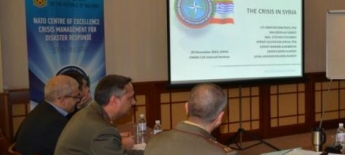 Internal CMDR COE Seminar on the Crisis in Syria
Internal CMDR COE Seminar on the Crisis in SyriaThe CMDR COE organised an internal seminar which was held on 20.12.2013. The main focus of the seminar was the crisis in Syria. The CMDR COE experts discussed issued related to the chronology of the crisis; the increased influx of refugees to neighbouring countries and Bulgaria; the positions of NATO, the UN and EU; the involvement of international humanitarian organisations etc.
» read more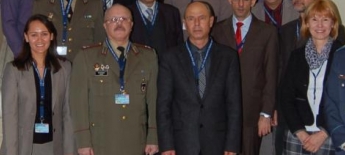 Visualizing Implications of Climate Change on Military Activities and Relationships was conducted
Visualizing Implications of Climate Change on Military Activities and Relationships was conductedOn 11-12 December 2013, the Crisis Management and Disaster Response Centre of Excellence (CMDR COE) co-hosted together with US European Command (USEUCOM) and the US embassy in Bulgaria the workshop Visualizing Implications of Climate Change on Military Activities and Relationships. The opening remarks were given by the Deputy Minister of Defence of Bulgaria, Mr. Ivan Ivanov, who welcomed the participants and underlined the importance of the topics that the workshop focused on.
» read more


